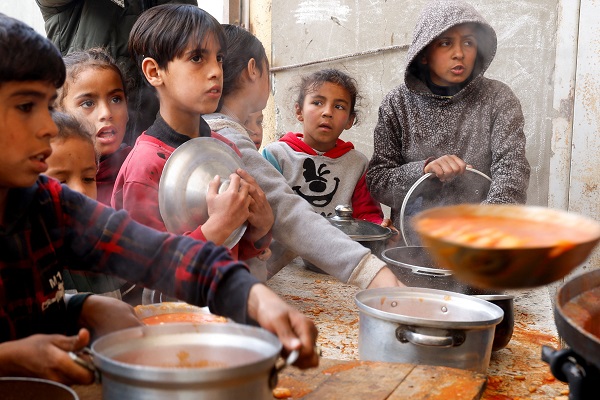 Palestinian children wait to receive food cooked by a charity kitchen, during the Muslim holy month of Ramadan, in Khan Younis, in the southern Gaza Strip, 9 March 2025;
Credit: Reuters/Hatem Khaled/File Photo
Palestinian children wait to receive food cooked by a charity kitchen, during the Muslim holy month of Ramadan, in Khan Younis, in the southern Gaza Strip, 9 March 2025;
Credit: Reuters/Hatem Khaled/File Photo
JERUSALEM/GENEVA (Reuters) - Aid agencies have criticised Israeli plans to take over distribution of humanitarian aid in Gaza and use private companies to get food to families after two months in which the military has prevented supplies from entering the enclave.
Israel has provided few details about its plans, announced on Monday 5 May 2025 as part of an expanded operation that it says could include seizing the entire Gaza Strip.
For the moment, the blockade will continue until a large-scale evacuation of the population from northern and central areas to the south, where there will be a specially designated area cleared near the southern city of Rafah, Israeli officials have said.
They said those entering the zone will be vetted by Israeli forces to ensure that supplies do not reach Hamas, with what aid agencies have described as special "hubs" to handle distribution.
Israel has already cleared around a third of the territory to create "security zones" and the aid plan, combined with plans for moving much of the population to the south, has reinforced fears that the overall intention is full occupation.
The UN humanitarian agency OCHA said on Tuesday 6 May 2025 that the plan was "the opposite of what is needed" and other agencies also questioned the plan, which they have only been briefed on verbally, according to two aid officials.
"It is totally wrong that a party to the conflict – in this case Israel - should be in control of lifesaving aid for civilians," Jan Egeland, secretary general of the Norwegian Refugee Council said on the social media platform X.
"This new Israeli aid plan is both totally insufficient to meet the needs in Gaza, and a complete breach of all humanitarian principles," he said.
Complexity of distribution
Aid officials have frequently accused Israel of deliberately disregarding the complexity of aid distribution in an environment such as Gaza, laid waste by nineteen months of a war that has destroyed much of its infrastructure and displaced almost all of its 2.3 million population several times.
They say the latest plans appear to echo previous Israeli ones for "humanitarian bubbles" or "civilian islands" that were rejected earlier in the war.
Israel has accused agencies including the United Nations of allowing large quantities of aid to fall into the hands of Hamas, which it accuses of seizing supplies intended for civilians and using them for its own forces.
"If Hamas continues to steal the aid from the people as well as earning money from it, the war will continue forever," Foreign Minister Gideon Saar said in a statement.
The government has said that cutting off aid is the best way to pressure Hamas to release 59 Israeli hostages held in Gaza.
However, aid agencies say the plan would mean stripping vital protection from aid deliveries and effectively compel a transfer of civilians from the north to the south, contributing to conditions that could lead to their being forced out of Gaza permanently.
Israeli hardliners have made no secret of their desire to see the Palestinian population moved out of Gaza, with politicians including Finance Minister Bezalel Smotrich declaring the plan would result in a full occupation of Gaza.
An earlier Israeli plan, known as the General Eiland plan, foresaw severe restrictions on aid to Gaza as a way of choking off supplies to Hamas, and Israeli hardliners have often harked back to the plan.
With many Palestinians believing that Israel's ultimate aim is to use aid as leverage to force them to leave and to occupy Gaza, one aid official said, fundamental mistrust of Israel could undermine the system.
"Would you be comfortable with your enemy providing you with aid?" the official asked.








